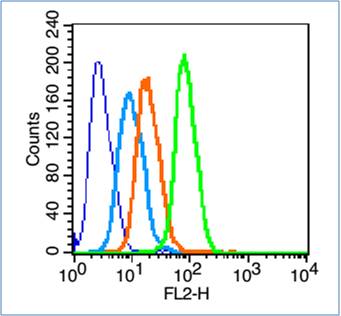
Rabbit Anti-phospho-CREB-1 (Ser142)antibody
phospho-CREB-1(S142); CREB-1(phospho Ser142); CREB-1(phospho S142); Active transcription factor CREB; cAMP response element binding protein; cAMP responsive element binding protein 1; CREB1; CREB 1; CREB1; MGC9284; Transactivator protein; CREB; CREB1_HUMA
View History [Clear]
Details
Product Name phospho-CREB-1 (Ser142) Chinese Name 磷酸化CREB-1抗体 Alias phospho-CREB-1(S142); CREB-1(phospho Ser142); CREB-1(phospho S142); Active transcription factor CREB; cAMP response element binding protein; cAMP responsive element binding protein 1; CREB1; CREB 1; CREB1; MGC9284; Transactivator protein; CREB; CREB1_HUMAN. Product Type Phosphorylated anti Research Area Tumour Cell biology immunology Signal transduction Apoptosis transcriptional regulatory factor Immunogen Species Rabbit Clonality Polyclonal React Species Human, (predicted: Mouse, Rat, Chicken, Pig, Cow, Horse, Sheep, ) Applications ELISA=1:5000-10000 IHC-P=1:100-500 IHC-F=1:100-500 Flow-Cyt=1μg/Test IF=1:100-500 (Paraffin sections need antigen repair)
not yet tested in other applications.
optimal dilutions/concentrations should be determined by the end user.Theoretical molecular weight 37kDa Cellular localization The nucleus Form Liquid Concentration 1mg/ml immunogen KLH conjugated Synthesised phosphopeptide derived from human CREB-1 around the phosphorylation site of Ser142: DL(p-S)SD Lsotype IgG Purification affinity purified by Protein A Buffer Solution 0.01M TBS(pH7.4) with 1% BSA, 0.03% Proclin300 and 50% Glycerol. Storage Shipped at 4℃. Store at -20 °C for one year. Avoid repeated freeze/thaw cycles. Attention This product as supplied is intended for research use only, not for use in human, therapeutic or diagnostic applications. PubMed PubMed Product Detail The ATF/CREB family consists of transcription factors that function through binding to the cAMP responsive element (CRE) palindromic octanucleotide, TGACCTCA. The best characterized members of this gene family include CREB-1, CREB-2, ATF-1,ATF-2,ATF-3and ATF-4. these transcription factors share highly-related COOH terminal leucine zipper demerization and basic DNA bindings but are highly divergent in their amino terminal domains. Although each of the ATF/CREB proteins bind CREs in their homodimeric form, in cerain instances they also bind as heterodimers, both within the ATF/CREB family and with members of the AP-1 transcription factor family. It has recentlybeen shown that protein kinase A-mediated CREB phosphorylation results in its binding to a 265kDa nuclear protein designated CBP (CREB-binding protein), which may reprecent a CREB co-activator.
Function:
Phosphorylation-dependent transcription factor that stimulates transcription upon binding to the DNA cAMP response element (CRE), a sequence present in many viral and cellular promoters. Transcription activation is enhanced by the TORC coactivators which act independently of Ser-133 phosphorylation. Involved in different cellular processes including the synchronization of circadian rhythmicity and the differentiation of adipose cells.
Subunit:
Interacts with PPRC1. Binds DNA as a dimer. This dimer is stabilized by magnesium ions. Interacts, through the bZIP domain, with the coactivators TORC1/CRTC1, TORC2/CRTC2 and TORC3/CRTC3. When phosphorylated on Ser-133, binds CREBBP (By similarity). Interacts with CREBL2; regulates CREB1 phosphorylation, stability and transcriptional activity (By similarity). Interacts (phosphorylated form) with TOX3. Interacts with ARRB1. Binds to HIPK2. Interacts with SGK1.
Subcellular Location:
Nucleus.
Post-translational modifications:
Stimulated by phosphorylation. Phosphorylation of both Ser-133 and Ser-142 in the SCN regulates the activity of CREB and participates in circadian rhythm generation. Phosphorylation of Ser-133 allows CREBBP binding. CREBL2 positively regulates phosphorylation at Ser-133 thereby stimulating CREB1 transcriptional activity (By similarity). Phosphorylated upon DNA damage, probably by ATM or ATR. Phosphorylated upon calcium influx by CaMK4 and CaMK2 on Ser-133. CaMK4 is much more potent than CaMK2 in activating CREB. Phosphorylated by CaMK2 on Ser-142. Phosphorylation of Ser-142 blocks CREB-mediated transcription even when Ser-133 is phosphorylated. Phosphorylated by CaMK1 (By similarity). Phosphorylation of Ser-271 by HIPK2 in response to genotoxic stress promotes CREB1 activity, facilitating the recruitment of the coactivator CBP. Phosphorylated at Ser-133 by RPS6KA3, RPS6KA4 and RPS6KA5 in response to mitogenic or stress stimuli.
Sumoylated with SUMO1. Sumoylation on Lys-304, but not on Lys-285, is required for nuclear localization of this protein. Sumoylation is enhanced under hypoxia, promoting nuclear localization and stabilization.
DISEASE:
Defects in CREB1 may be a cause of angiomatoid fibrous histiocytoma (AFH) [MIM:612160]. A distinct variant of malignant fibrous histiocytoma that typically occurs in children and adolescents and is manifest by nodular subcutaneous growth. Characteristic microscopic features include lobulated sheets of histiocyte-like cells intimately associated with areas of hemorrhage and cystic pseudovascular spaces, as well as a striking cuffing of inflammatory cells, mimicking a lymph node metastasis. Note=A chromosomal aberration involving CREB1 is found in a patient with angiomatoid fibrous histiocytoma. Translocation t(2;22)(q33;q12) with CREB1 generates a EWSR1/CREB1 fusion gene that is most common genetic abnormality in this tumor type.
Note=A CREB1 mutation has been found in a patient with multiple congenital anomalies consisting of agenesis of the corpus callosum, cerebellar hypoplasia, severe neonatal respiratory distress refractory to surfactant, thymus hypoplasia, and thyroid follicular hypoplasia (PubMed:22267179).
Similarity:
Belongs to the bZIP family.
Contains 1 bZIP domain.
Contains 1 KID (kinase-inducible) domain.
SWISS:
P16220
Gene ID:
1385
Database links:
Entrez Gene: 1385 Human
Entrez Gene: 12912 Mouse
Omim: 123810 Human
SwissProt: P16220 Human
SwissProt: Q01147 Mouse
Unigene: 516646 Human
Unigene: 453295 Mouse
Unigene: 90061 Rat
Product Picture
Primary Antibody (green line): Rabbit Anti-phospho-CREB-1(Ser142) antibody (SL5269R),Dilution: 1μg /10^6 cells;
Isotype Control Antibody (orange line): Rabbit IgG .
Secondary Antibody (white blue line): Goat anti-rabbit IgG-PE,Dilution: 1μg /test.
Bought notes(bought amounts latest0)
No one bought this product
User Comment(Total0User Comment Num)
- No comment



 +86 571 56623320
+86 571 56623320
 +86 18668110335
+86 18668110335

